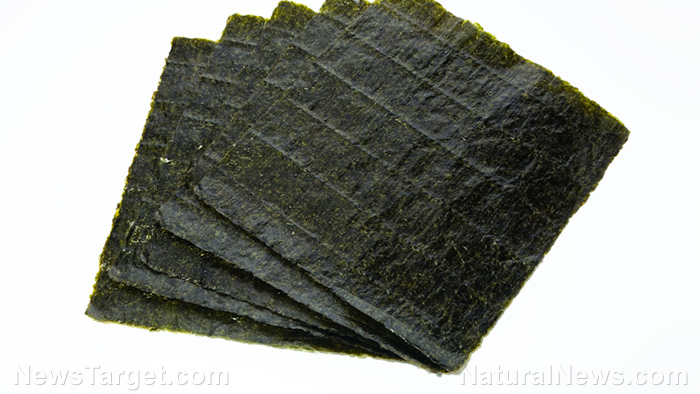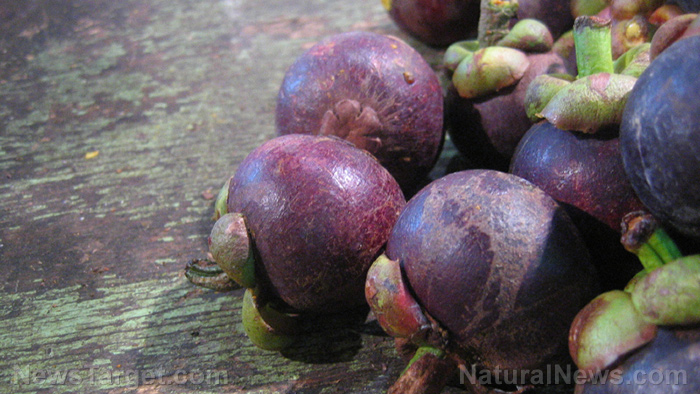Study: You can reshape your gut microbiome for the better by eating more nori
08/16/2018 / By Michelle Simmons

Improve your gut health by eating nori seaweed. In a study published in the journal Nature, the seaweed most commonly used as a wrap for sushi has been found to contain a specific carbohydrate that could help encourage the growth of certain probiotic strains. The study, carried out by a team of researchers at the Stanford University School of Medicine, reported that eating seaweeds could help produce a particular strain of Bacteroides in the gut.
For the study, the research team used a mouse model to show that it is possible to favor particular bacterial strains over others through the inclusion of certain dietary compounds. The team aimed to find a way to manipulate and promote the growth and engraftment of one particular compound, which could also allow control over the level of growth by calibrating dietary levels.
The team visited a waste-water treatment facility in search of members of the Bacteroides genus, which have the ability to digest nori seaweed. Then, the team screened the bacteria they gathered for an ability to use a carbohydrate found in nori called porphyran. Among humans who do not have seaweed as a common part of their diet, the genes that enable a bacterium to digest porphyran are extremely rare.
“This allowed us to test whether we could circumvent the rules of complex ecosystems by creating a privileged niche that could favor a single microbe by allowing it to exist in the absence of competition from the 30 trillion other microbes in the gut,” explained Justin Sonnenburg, the senior author of the study.
As soon as they found a strain of Bacteroides that can digest the nori carbohydrate, the team attempted to introduce it to three groups of laboratory mice: one group served as the control group, while the two groups had their own gut bacteria removed and replaced with that of healthy human donors.
After feeding the mice with a typical diet, the team saw that the porphyran-digesting strain of Bacteroides populated two groups to “varying and limited degrees,” at the same time, one group rejected the new strain completely.
On the other hand, when the mice were fed with nori, the strain populated the guts robustly at similar levels in all the mice. In addition, the team discovered that they could manipulate the population size of the newly introduced bacteria by feeding the mice with more or fewer amounts of nori.
The findings of the study suggest that the microbiome could be reshaped in a deliberate manner in order to enhance health and prevent diseases.
The other benefits of nori seaweed
Also referred to as laver, nori is a type of edible seaweed that is commonly used in Asian countries, such as Japan, China, and South Korea. Nori seaweed is considered healthy, providing several benefits:
- Rich in B-vitamins – Studies have shown that nori contains substantial amounts of vitamin B12, with around 54.5 to 58.6 micrograms (mcg) of vitamin B12 per 100 grams (g) of dry weight. Moreover, it was found to have five different types of biologically active vitamin B12 compounds, including cyano-, hydroxo-, sulfito- adenosyl-, and methylcobalamin coenzymes. (Related: Nori is a high-protein plant source of vitamin B-12.)
- Great source of iodine – Edible seaweeds, such as nori, are good sources of dietary iodine as they build up great amounts of iodine from seawater.
- Good source of unsaturated fatty acids – Nori is packed with unsaturated fatty acids, such as eicosapentaenoic acid (EPA) and linoleic, linolenic, and arachidonic acids.
- Packed with minerals – Nori is rich in minerals, such as zinc, manganese, iron, selenium, and copper, that contain antioxidant properties.
- Rich in amino acids – It is also a great source of free and bound amino acids, including alanine, aspartic acid, glycine, glutamic acid, lysine, arginine, leucine, histidine, and isoleucine. These amino acids help regulate blood control levels and play a role in muscle building.
Read more news stories and studies on beneficial foods by going to FoodScience.news.
Sources include:
Tagged Under: Diets, digestion, digestive health, food as medicine, food cures, functional food, gut health, gut microbiome, natural cures, nori, nutrition, seaweed



















